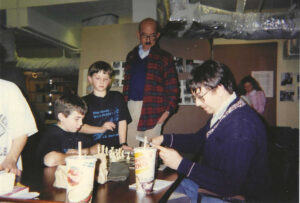
Rogers’ observations are in line with what we at the Chess Center have seen throughout our history of organizing events for young people. Few other pursuits can match the universal accessibility of chess to players of all ages, genders, backgrounds, and physical capabilities. And unlike with an electronic game franchise that has new editions or sequels coming out every year, parents who take up the hobby of chess alongside their children don’t have to worry about the game being replaced. Chess is an activity that has stood the test of time. The rules have not changed in half a millennium, but the strategic complexity of the game keeps us all interested.
All of our instructors who were fortunate enough to learn chess in our childhoods now look back on those years with great fondness; we remember the first time we sat across from an adult at a chess board, playing or discussing a game, and were treated as equals.
